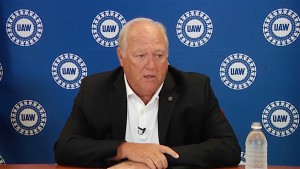
UAW President Dennis Williams criticized Ford Motor Co. for moving EV production from the U.S. to Mexico.
The United Auto Workers has made it plain that it objects the Ford Motor Co.’s decision to place production of electric vehicles: Mexico.
“I’m not happy with Ford,” UAW President Dennis Williams told reporters today during a meeting at the union’s headquarters in Detroit. “I think we’re missing a huge opportunity in this country.”
Earlier this month, Ford announced plans to move EV production from a suburban Detroit factory to its plant in Cuautitlán, Mexico, starting in 2020. That will make room at the Flat Rock, Michigan, facility for the fully driverless vehicles Ford is currently developing.
(For more on this story, Click Here.)
Ford has been moving a lot of products around as it looks to meet the wants and needs of a changing market. Last year announced it would also move the Focus from a second Detroit-area plant to an all-new factory it was building in Mexico.
Williams has long criticized automakers doing business in Mexico and NAFTA because companies pay Mexican workers pennies on the dollar compared to wages in America, artificially inflating labor costs in the U.S. He believes that the Trump Administration’s efforts to revise the labor deal will fail unless something is done to raise the wages of Mexican workers.
“They’re focused on rules of origin and all that,” he said. “But one thing you have to demand a different standard of living for Mexican workers. General Motors, Ford Motor Co., FCA, Nissan and Toyota could set an example by their wages,” Williams added. “You don’t need any changes in NAFTA for them to do that.”
The soon-to-retire labor boss offered insights in a wide range of topics during the interview, including education, vocational training, taxes and the environment.
He noted that the U.S. is not investing enough in the new technology and science needed to compete effectively with companies from Europe and Asia.
(Click Here to see more about Williams’ successor, Gary Jones.)
“Our society, as a whole, is not going to be prepared for the next generation of technology and the next generation of science. We not were giving our children the opportunity to have the finest education in the world,” he said.
Williams believes the new tax bill approved by the Republican-led Congress along party lines does nothing to encourage investment in the U.S. “When you look at the tax plan, you are giving millions of dollars in tax breaks to corporations without offering any kind of incentive to invest in the U.S.,” he said.
Many analysts and economists believe the rising social costs of increasing the debt outweighs the short-term benefits of a tax cut, Williams noted.
“There will be an upswing, but the wealthy are going to throw it into Wall Street not Main Street,” he said. “Meanwhile, our schools are falling apart we’re not investing in apprenticeships. We’re leaving behind a whole generation of young people.”
Williams lamented the lack of focus on vocational training in the U.S. as well as math and science.
(Is the ground collapsing under the UAW? For more, Click Here.)
“On top of that they’re letting the environment go to crap. I’m a fisherman and a hunter, I can see the changes,” added Williams, who also emphasized that the union favored to orderly increases in the federal fuel economy standards.

The UAW’s time has passed and they are no longer needed. The prices of new vehicles is at an all time high thanks to them.
Unions are driving up costs on everything. Enough already.
John, I have plenty of reason to gripe about the UAW but I think your view may not be based on accurate data. First, labor accounts for, at most, 11% of the total cost of a new vehicle. (The figure includes labor in components purchased from outside suppliers, as well as on the assembly line.) Labor costs have actually come down since the Great Recession, especially when adjusted for inflation. Productivity, meanwhile, has risen sharply. UAW costs are no longer way out of line compared with non-union plants, though the Big 3 workers tend to be less flexible. Problems at non-union plants (Tesla is notable) with issues like injuries and use of permanent “temp” workers to sidestep set wage and benefit rates is more significant than at union plants. And so on. I think we are seeing some issues that raise serious concerns about the UAW, and while there may be slight cost differences, I think you’d find Big 3 products do not reflect a UAW penalty in their pricing.
Paul E.